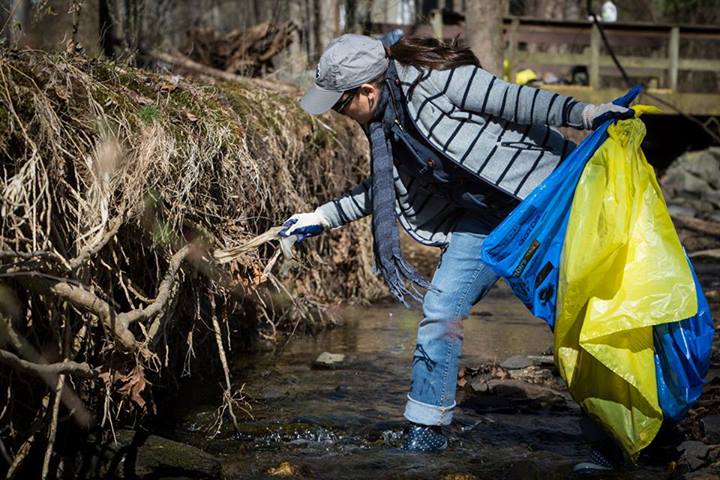In the online section of Professor Patricia Boudinot’s GGS 315 Geography of the United States, students are not just active members of an online learning community. They are also encouraged to get involved in their own local communities all around the country.
The course is currently being offered online for the first time, but Professor Boudinot feels there is no reason to exclude key face-to-face components from the virtual classroom. She elaborates, “Sustainability is one of the critical concepts discussed in the course, and students should be prepared to learn it in theory as well as put it into practice.”
Seeking Volunteer Opportunities
On the morning of Saturday, April 5, 2014, participants from Professor Boudinot’s course joined thousands of Reston families and area-wide volunteers in removing over 300 tons of trash during the 26th Annual Potomac River Watershed Cleanup. The event was coordinated by the Alice Ferguson Foundation and Reston Association, inviting volunteers to “come learn about our watersheds and see what ‘interesting’ artifacts end up in our streams” (1).
GGS 315 participates in the 26th Annual Potomac River Watershed Cleanup on April 5, 2014.
Photo courtesy of Ha Brock and the Reston Association.
Professor Boudinot considered the event to be an appropriate outlet for students to apply course concepts, build professional portfolios, and simply to get involved in active efforts to sustain the environment.
As many GGS 315 students are not located in the Fairfax area, participation in the event was not required. Instead, Professor Boudinot and her Teaching Assistant, Peter, made a post on the course Blackboard page encouraging students to participate in volunteer opportunities within their own communities. “We all live in a community, no matter where we are,” she explains. “We all will establish a connection with the outside world, so I promote an active approach.”
Building an Online Community
To build an online community within the course, Professor Boudinot facilitates student-to-student interaction through discussion boards that promote conversation and allow students to practice critical thinking approaches. The course also features extensive group projects that examine issues of human-environment interaction, with topics ranging from gentrification and fiscal freezes to the installation and utilization of the trans-Alaska pipeline.
Ensuring that her students have adequate accessibility to course content, she uses Screencast-O-Matic software to capture course lectures and offers extended office hours through Skype as an additional opportunity for interaction. Through an active and accessible online community, Professor Boudinot prepares her students to branch out and positively impact the environment, affecting not one but multiple communities at a time. Like many of Mason’s online courses, Professor Boudinot’s GGS 315 provides a valuable practicum experience while catering to the needs of diverse students.
(1) Reston Association. (2014). 26th Annual Potomac River Watershed Cleanup. Retrieved from http://reston.org
Image: Participants from Professor Patricia Boudinot’s GGS 315 course joined thousands of Reston families and area-wide volunteers for the 26th Annual Potomac River Watershed Cleanup, coordinated by the Alice Ferguson Foundation and Reston Association. Photo used with permission of Ha Brock and the Reston Association.
Majoros, Mark W (2014). [Reston Families join Volunteers for Annual Potomac River Watershed Cleanup] [Digital Image]. Retrieved from https://www.facebook.com/VolunteerReston
 Mason Online
Mason Online